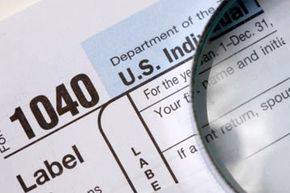If you're like many people in the United States, you probably dread the weeks leading up to April 15. This is tax season, and unlike some other, more joyful seasons of the year, this one doesn't always bring glad tidings. For many people, it means scrambling to figure out tax code to complete and file tax returns with the Internal Revenue Service (IRS) in time for the April 15 deadline. The goal for you, apart from simply understanding how to fill out the seemingly indecipherable forms, is probably to figure out the amount you're legally obligated to shovel out to Uncle Sam.
However, because the tax code is so complicated, it can be tremendously difficult to find all of the tax burdens and benefits that apply to your situation. You might feel overwhelmed, but you aren't alone. In fact, studies estimate that more than half of Americans decide to use professional help with their taxes [source: Consumer Reports]. In 2010, even the IRS commissioner admitted to using a tax preparer because he found the tax code "complex" [source: C-SPAN].
Advertisement
But if you're also shouldering student loan payments on top of income taxes, there might be some good news. Since 1998, taxpayers who are paying back student loans have been able to take advantage of a handy tax deduction. It allows you to deduct the interest on student loans that you've paid during the tax year. You don't even have to itemize your deductions to take advantage of this perk -- it is considered merely an adjustment to the income you report for tax purposes [source: IRS].
However, it's not as simple as it looks at first glance -- alas, little in the tax code is, it seems. Some limits and caveats apply. For instance, the maximum deduction you can take is $2,500 -- even if you paid more than this in student loan interest [source: IRS]. In the next few pages, you'll learn more of the rules in addition to some little-known tips related to this tax perk.
You can find all the tax code relating to this benefit, including particular details on how to fill out the forms, from the IRS document, Publication 970. We're drawing the information for this article from Publication 970 for the tax year 2009.
Up first, find out whether you qualify to deduct your student loan interest on your income taxes.
Advertisement

